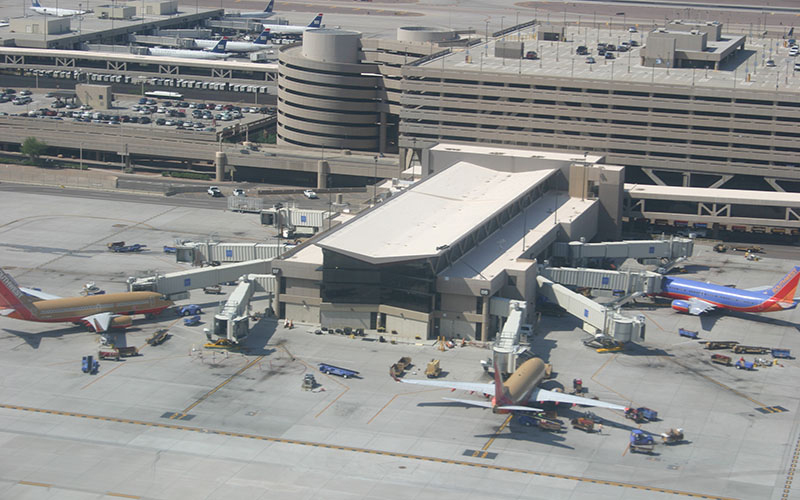
A Columbia University research study says heat waves like the one that grounded 50 regional flights at Phoenix Sky Harbor Airport could occur more often because of climate change. (Photo via Creative Commons)
(Cygnusloop99/CC)
PHOENIX – Climate change that brings rising temperatures could lead to more grounded flights, according to a Columbia University study.
More than 50 flights at Sky Harbor Airport in Phoenix were canceled earlier this summer as heat reached a record 118 degrees. The study suggests delays and cancellations could become routine.
Since 1980, the average global temperature has risen two degrees. The study projects the annual maximum temperature at airports could climb another 7 to 14 degrees over the next 80 years.
Extremely high temperatures deplete the density of air, making it harder for planes to maintain lift, said climate scientist Radley Horton.
“We’re going to have much more frequent heat waves and that’s going to mean that the occurrence of this kind of event will occur more often and also that weight restrictions will be larger,” Horton said. “More people or cargo will have to be removed from flights, even if the temperatures go up just a few degrees, as we expect with climate change.”
He said the scientific community has already recognized the reality of global warming but heat waves offer people a clearer way to see it.
Former commercial pilot Jim Tilmon, who flew with American Airlines for nearly three decades, said the rising heat is already forcing airlines to reduce passenger loads.
“The situation we have now is serious,” Tilmon said. “It’s more serious than just the conversation or the debate about global warming and climate change and all that. But I’ll tell you this: there’s a limit to how hot it can get for an airplane to be efficient.”
He said besides problems with air density, engines would have trouble functioning in extreme heat.
“It’s going to obviously get worse,” Tilmon said. “Every one of these parameters we’re talking about becomes much more significant as you see a temperature rise of just a degree or two.”
He said airlines make safety a priority and that the recent delays at Sky Harbor had more to do with paperwork than aircraft quality. Though the smaller jets might have been equipped to fly in the heat, they had not been certified to do so.
“I think we have to be careful about jumping to conclusions,” Tilmon said. “A little information can be detrimental to making good decisions. What we need to do is pay attention to what the airlines tell us. The aviation industry is very, very concerned about safety. That’s their number one thing.”
He said manufacturers can construct planes to handle higher temperatures, but there is a limit.
Airports like Phoenix’s Sky Harbor have also adjusted to the problem by extending runways. Longer runways make it easier to attain lift. This too, he said, offers limited solutions because, eventually, no amount of runway can would make up for the difficulties in gaining lift.
Horton said emissions from air traffic accounted for 3 to 4 percent of the global buildup of greenhouse gases in the atmosphere and that there were further innovations airlines could make in order to reduce carbon fumes from plane engines.
Horton said further study may reveal other ways airlines can adapt.